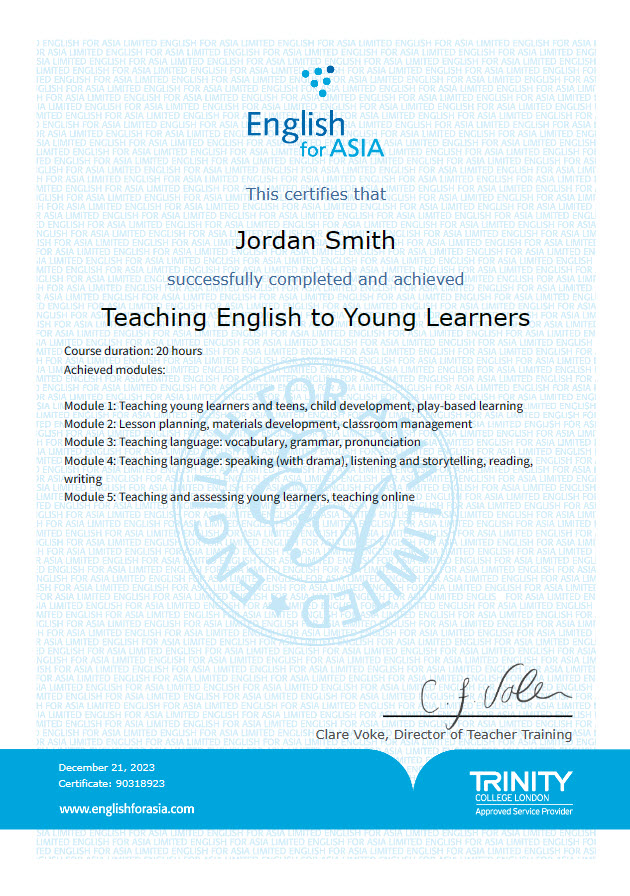This specialist course is designed for teachers who want to develop their knowledge and practical skills in the context of teaching English to young learners from primary school age to teens. It provides practical guidance on classroom management, materials design, and the theory of language teaching to young learners.
Developed by renowned trainers who also deliver the Trinity CertTESOL and TYLEC, and containing content adapted from our Trinity TYLEC qualification.
This self-study course contains material adapted from our Trinity TYLEC qualification. Get some insight into what you can work towards from these past trainees sharing their experiences on the full TYLEC qualification:
This course is for you if
This course might not be for you if
The course offers an excellent extension to the CertTESOL and CELTA for teachers looking to teach young learners.
Our typical trainees include
This online self-access course will
You can progress through this course at your own pace, watching videos, listening to podcasts, observing trainers, sharing ideas with peers and completing reflective tasks. There are short quizzes within the course, but these are not as rigorous as those on the Trinity TYLEC, and there is no teaching practice.
Completion of all course material is required if you wish to be awarded a certificate of completion.
You will find multi-modal and engaging content, including
Learning input on this course varies to include engaging with texts, analysing classroom examples and observing aspects of teaching practice. This is supplemented with a series of tasks, including contributions to a discussion forum.
Quiz answers in this course will be available once you have completed the task. This enables you to review your ideas and highlight areas of focus that you need to work on.
Across 20 units, the course covers
After completing all of the course modules, you will need to take the final test. You will need to achieve a score of 50% or higher to complete the course and receive your digital credential. You can retake the final test up to two times (three attempts in total), and you can revisit any sections of the course to study up on questions that you find difficult.
If you successfully pass the final test, you will immediately receive your digital credential. Your digital credential includes an e-certificate, which can be downloaded and printed, and a credential badge which can be displayed on your social media and LinkedIn profiles, allowing you to showcase your achievements.
Our credentials are incorruptible digital certificates encoded on blockchain, to ensure they cannot be altered or copied by anyone and can be easily verified by institutions. We use the same credential issuing platform as leading universities including Harvard, Oxford, Berkeley, and Johns Hopkins.

Karin Xie
ESOL Academic Manager (China Office), CertTESOL Trainer
Kevin Clare
Director of Teacher Training
Lora Guo
Examinations Manager
Maria Björning-Gyde
CertTESOL, CertPT and DipTESOL Trainer, Course Writer
You're only a few clicks away from your Teaching Young Learners course – get going in a matter of minutes!
Build a solid foundation for the Trinity TYLEC.
The Teaching English to Young Learners course features 20 hours of online self-access study, to help you develop the key skills needed to teach English to Young Learners with materials adapted from our Trinity TYLEC qualification..
The course will
From the date of purchase, you will have 3 months access to the course.
On successful completion of the course you will receive a digital credential. Your digital credential includes an e-certificate, which can be downloaded and printed, and a credential badge which can be displayed on your social media and LinkedIn profiles.